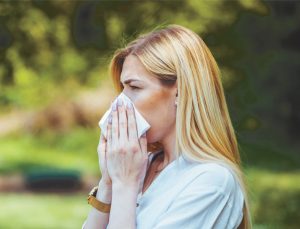Jose M. Baez, M.D., F.A.C.P., Board Certified by American Board of Internal Medicine
 Spring has finally sprung and while we are enjoying amazing weather and getting ready for summer, for some spring means watery eyes, a runny nose, and itchy skin. Allergies and asthma are two of the most common chronic diseases in the United States.
Spring has finally sprung and while we are enjoying amazing weather and getting ready for summer, for some spring means watery eyes, a runny nose, and itchy skin. Allergies and asthma are two of the most common chronic diseases in the United States.
According to Mayo Clinic, allergies occur when your immune system reacts to a foreign substance — such as pollen, bee venom or pet dander — or sometimes a food that doesn’t cause a reaction in most people.
Your immune system produces substances known as antibodies. When you have allergies, your immune system makes antibodies that identify a particular allergen as harmful, even though it isn’t. When you come into contact with the allergen, your immune system’s reaction can inflame your skin, sinuses, airways or digestive system.
The severity of allergies varies from person to person and can range from minor irritation to anaphylaxis — a potentially life-threatening emergency. While most allergies can’t be cured, treatments can help relieve your allergy symptoms.1
Asthma is a long-term disease that causes inflammation and swelling of the airways. This results in narrowing of the airways that carry air from the nose and mouth to the lungs. Asthma symptoms include trouble breathing (shortness of breath), wheezing, coughing, and tightness or pain in the chest. Its symptoms can be triggered by different things for different people. Allergens, like dust or pet dander, are common triggers. Some people also develop asthma symptoms in response to certain foods or to exercise.
Asthma can be deadly. As with allergies, there is no cure for asthma, but appropriate treatment prevents asthma attacks and can help you have a better quality of life. Sadly, it is one of the most common and costly diseases in the United States.
What many people may not realize is the link between allergies and asthma, which often occur together. If you experience either condition, you can benefit from learning about how they are related. Doing so will help you limit your exposure to triggers and treat your symptoms.
Many people experience one condition without the other, but allergies can either worsen asthma or trigger it. When these conditions are so closely related, it’s known as allergy-induced or allergic asthma. It is the most common type of asthma diagnosed in the United States. It affects 60 percent of people with asthma.
Many of the same substances that trigger allergies can also affect people with asthma. As previously mentioned, pollen, spores, dust mites, and pet dander are examples of common allergens. When people with allergies come into contact with allergens, their immune system attacks the allergens the same way they would attack bacteria or a virus. This often leads to watery eyes, runny nose, and coughing. It can also cause a flare-up of asthma symptoms. Therefore, it can be helpful for people with asthma to closely watch the pollen count, limit time spent outside on dry and windy days, and be mindful of other allergens that may induce an asthmatic reaction.
Family history affects a person’s chances of developing allergies or asthma. If one or both parents have allergies, it’s much more likely that their children will have allergies. Having allergies such as hay fever increases your risk of developing asthma.
Does an asthma attack triggered by allergies feel different than a typical asthma attack?
When you have an asthma attack that’s triggered by your allergies, it is a severe flair up of your asthma symptoms. During an asthma attack, your airways will tighten, making it difficult to breathe. You may also feel chest pressure, wheeze and cough. The symptoms of an allergic asthma attack are the same as an asthma attack caused by something else. The difference between the two is the cause of the asthma attack. When you experience severe asthma symptoms after breathing in an allergen, this is typically allergic asthma.2
Whether you are dealing with seasonal or year-round allergies, chronic asthma, or allergic asthma, seeing a doctor is the best step you can take toward living well in spite of these conditions. While there is no cure, adequate and informed treatment can improve your quality of life while experiencing allergies or asthma. Over the counter medicines can and do offer relief, but it is easy to treat yourself with the wrong medicine and not get the relief you so desperately need. If you’d like to speak to a doctor, contact Dr. Jose Baez, MD. Dr. Baez is a Board-certified physician with more than 30 years’ experience. He can be contacted via email at info@JoseMBaezMD.com or by calling his office at 239.777.0663. His website (www.josembaezmd.com) includes information about concierge medicine and how it can work for you.
About Dr. Baez
José M Baez MD, FACP is a Board-certified Internal Medicine specialist with over 30 years of experience in both inpatient and outpatient settings. He is a Graduate of Mt. Sinai School of Medicine in NY. As a Ward Attending at Harlem Hospital, affiliate of Columbia University College of Physicians and Surgeons, he served the Greater NYC community. Subsequently, he established a private practice in Fairfield County, CT. He was also Assistant Clinical Professor at University of Connecticut, School of Medicine. Dr. Baez has been a stable member of the Naples community for 10 years, a member in good standing with the Collier County Medical Society and voted Naples Illustrated Top Physician 2018, 2019, 2020, 2021 and 2022.
José M Baez MD, FACP
11181 HEALTH PARK BLVD., SUITE 1180
NAPLES, FL 34110
(239) 777-0663
1. Allergies (2022) Mayo Clinic. Mayo Foundation for Medical Education and Research. Available at: https://www.mayoclinic.org/diseases-conditions/allergies/symptoms-causes/syc-20351497 .
2. Allergic asthma: Causes, symptoms, tests & treatment, Cleveland Clinic. Available at: https://my.clevelandclinic.org/health/diseases/21461-allergic-asthma.









